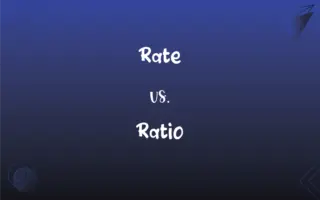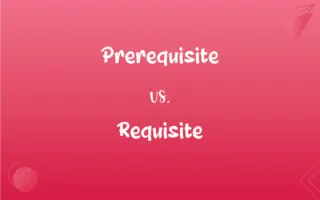Composition vs. Comprehension: What's the Difference?
Edited by Janet White || By Harlon Moss || Published on November 18, 2023
Composition refers to the act of creating or combining parts to form a whole, while comprehension is the ability to understand and grasp information.

Key Differences
Composition involves the craft of writing or creating content, whereas comprehension focuses on the reader's ability to understand that content.
Composition is about construction, putting ideas, elements, or materials together. Comprehension, in contrast, is the mental process of interpreting and understanding these assembled elements.
In schools, composition classes teach students how to write essays, stories, or poems. Comprehension exercises assess students' understanding of read texts.
Good composition requires creativity, organization, and clarity. Successful comprehension depends on focus, analytical skills, and prior knowledge.
A well-done composition effectively conveys ideas to its audience. Superior comprehension allows readers to not just understand but also analyze, interpret, and discuss what they've read.
ADVERTISEMENT
Comparison Chart
Function
Creating or combining
Understanding and interpreting
Role in Education
Taught to improve writing skills
Assessed to gauge reading skills
Requires
Creativity, organization
Focus, analytical skills
Outcome
Convey ideas
Understand, analyze, interpret texts
Application
Writing essays, creating music, art
Reading texts, listening to lectures
ADVERTISEMENT
Composition and Comprehension Definitions
Composition
The act of writing or creating content.
The composition of her essay took three hours.
Comprehension
The level of understanding or knowledge about a particular subject.
The course tested our comprehension of molecular biology.
Composition
The way in which various elements are combined or arranged.
The chemical composition of the solution was complex.
Comprehension
The ability to perceive, decode, and interpret written or spoken language.
Language courses often include comprehension exercises.
Composition
A creative work, like a piece of music or art.
Beethoven's compositions are timeless.
Comprehension
Grasping the meaning, nature, or importance of information.
Her comprehension skills were exceptional, making her a quick learner.
Composition
The structure or makeup of something.
The composition of the board has changed over the years.
Comprehension
The act or capability of understanding something.
His comprehension of the novel was profound.
Composition
An artwork, especially one created using a particular medium.
The artist showcased his latest composition at the gallery.
Comprehension
Insight or discernment gained through reading or listening.
After several readings, she gained full comprehension of the topic.
Composition
The combining of distinct parts or elements to form a whole.
Comprehension
The act or fact of grasping the meaning, nature, or importance of; understanding.
Composition
The manner in which such parts are combined or related.
Comprehension
Capacity to include; comprehensiveness.
Composition
General makeup
The changing composition of the electorate.
FAQs
How can one improve their composition skills?
Practice, feedback, studying good examples, and understanding structures can help.
Can one have good composition skills but poor comprehension?
Yes, someone might write well but struggle to understand others' writings.
In what fields is composition essential?
Writing, music, art, and any field requiring the arrangement of elements.
Is comprehension crucial for learning?
Yes, comprehension is fundamental to grasping and retaining new information.
Are there tools to assess comprehension?
Yes, there are quizzes, tests, and exercises designed to gauge comprehension.
Does composition always require creativity?
While beneficial, not all composition requires creativity, like factual reports.
Can comprehension affect communication?
Yes, effective communication relies on both parties' comprehension.
Is comprehension linked to memory?
Yes, understanding content can aid in its retention and recall.
What can hinder good composition?
Lack of clarity, organization, or understanding of the subject can hinder composition.
Can one's comprehension vary by topic?
Yes, someone might comprehend certain subjects better due to interest or experience.
How do authors ensure their composition is clear?
They consider their audience, structure their content, and often seek feedback.
How do teachers evaluate composition skills?
Through assignments, peer reviews, and assessing clarity and coherence.
Why is the composition of a team important?
The right composition can maximize a team's strengths and achieve better results.
Can visual aids improve comprehension?
Yes, visuals can often enhance understanding, especially for complex topics.
Is composition always related to writing?
No, composition can also refer to music, art, or any combination of elements.
Is comprehension solely about reading?
No, comprehension can be about understanding spoken words, visuals, or concepts.
How does prior knowledge impact comprehension?
Prior knowledge can enhance comprehension by providing context.
Why might someone struggle with comprehension?
Factors like distractions, lack of prior knowledge, or complexity of the content can affect comprehension.
Can comprehension be developed over time?
Absolutely, with practice and exposure to diverse content.
How is the composition of a material defined?
It's defined by the elements or components that make up that material.
About Author
Written by
Harlon MossHarlon is a seasoned quality moderator and accomplished content writer for Difference Wiki. An alumnus of the prestigious University of California, he earned his degree in Computer Science. Leveraging his academic background, Harlon brings a meticulous and informed perspective to his work, ensuring content accuracy and excellence.
Edited by
Janet WhiteJanet White has been an esteemed writer and blogger for Difference Wiki. Holding a Master's degree in Science and Medical Journalism from the prestigious Boston University, she has consistently demonstrated her expertise and passion for her field. When she's not immersed in her work, Janet relishes her time exercising, delving into a good book, and cherishing moments with friends and family.






































































